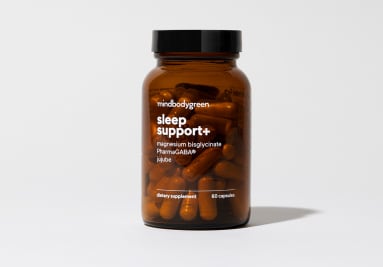Science Reveals A New Risk Factor For Breast Cancer (Especially In Women 50+)
Here's what to do about it

Image by Clique Images / Stocksy May 27, 2023 It’s difficult to overstate the importance of good sleep, yet many of us regularly fail to get enough of it1, potentially putting ourselves at an increased risk of disease and negatively affecting our quality of life. While getting enough high-quality sleep is easier said than done, studies show that it’s worth prioritizing for many reasons, including that lack of sleep is a potential risk factor for developing breast cancer.
Advertisement
This ad is displayed using third party content and we do not control its accessibility features.
The link between sleep, depression, and breast cancer
Depressive symptoms and lack of sleep may put women, particularly older women, at a heightened risk of developing breast cancer, according to a study recently published in China CDC Weekly.
Researchers used data from a large population-based study of Chinese women conducted from 2018 to 2020. They analyzed the relationship between self-reported depressive symptoms, sleep duration, and breast cancer risk in 63,000 women.
The study acknowledged that psychological and lifestyle factors have been known to play a role in breast cancer development, but studies on the link between depression, sleep duration, and breast cancer risk have been inconclusive up to this point.
Researchers concluded that depression, short sleep duration, and reduced sleep satisfaction could be risk factors for developing breast cancer, specifically among middle-aged and elderly women, but more research is needed to validate their findings.
What to do
There are plenty of reasons to work on your mental health and sleep quality. To begin with, the two are inextricably linked. Research shows that a lack of quality sleep is strongly linked to feelings of depression. Fortunately, there are steps you can take to improve your mood and sleep quality:
Create a bedtime routine. Finding a routine that works for you and incorporates the best sleep hygiene practices can make a huge difference in your quality of sleep. Experts say you should aim to fall asleep around the same time each night and wake up around the same time each morning. To prepare you for bed, cut back on caffeine at least six hours before you plan to hit the sack. Try incorporating a short, relaxing yoga routine before bedtime, or jot down some feelings in a journal to release some of those racing thoughts that could potentially keep you up at night.
Consider supplements. Supplements and sleep aids made with science-backed ingredients can help you fall asleep faster, stay asleep longer, and calm stress. You want to look for certain ingredients (for example, magnesium bisglycinate, jujube seed extract, and GABA have all been shown to support sleep health) in your supplements. Need help finding one that works for you? Take a look at these top picks that sleep experts recommend.
Tire your body through exercise. Regular exercise (done earlier in the day, not too close to bedtime) promotes deep sleep. The type of exercise and intensity level is up to you; simply moving your body is enough to help sleep. But if you can get outdoors, that may be best. Experts also say that exposure to natural light can improve your sleep quality and mood throughout the day—a win-win.
Find sanctuary in your bedroom. Your bedroom should be a place to sleep. Head there only when you’re ready to snooze—not to do some evening reading or watch Netflix. Lying in bed before you’re ready to sleep isn’t a good idea. Instead, turn your bedroom into a sleep sanctuary with a comfortable bed and bedding. Look forward to finally retiring there after a long day.
Advertisement
This ad is displayed using third party content and we do not control its accessibility features.
The takeaway
The reasons to take care of your sleep quality continue to grow. A Chinese study showed that there may be a link between poor sleep, depression, and a heightened risk of developing breast cancer, particularly in older women.

Francesca Bond
Francesca Bond is a freelance writer, newspaper reporter, and film photographer. She writes about fashion and culture in her newsletter, things i probably wrote in caffe aroma. She received her bachelor’s degree in journalism from SUNY Buffalo State and lives in Buffalo, New York.

 Konoly
Konoly 

































